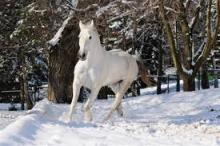Recurrent airway obstruction (RAO) is a condition seen more commonly in winter months when horses are stabled more often.
What is RAO?
RAO is reaction of the horses airways to dust or moulds in the environment causing the airways to narrow and fill with mucus.
Why should you be concerned?
RAO can be very distressing as it can cause difficulties breathing in severe cases. It can also affect the performance of your horse.
What are the symptoms?
- Coughing
- Discharge from the nostrils (usually very thick)
- Flaring on nostrils
- Increased breathing rate
- Wheezing
- Lack of energy/poor performance
- Severe episodes - respiratory distress
What can you do?
If you think your horse may suffer from RAO call your vet, we will give your horse a full examination; including listening to their lungs and heart. In some cases we need to scope the airways to look for inflammation in the airways and collect samples of the mucus to give a definitive diagnosis.
Treatment
Making changes in the horse's environment is very important in managing RAO, this is by reducing exposure to dust and mould. Bedding often needs to be changed to a dust extracted product such as shavings or chopped hemp. Hay should be fed damp by soaking it for several hours or even consider switching to haylage. Keeping them outside as much as possible will also help greatly, air is cleanest out in the field! You can though improve ventilation inside the stable by keeping windows open or creating air outlets at the back of the stable.
Drugs such as steroids on bronchodilators can be use to reduce inflammation and open the airways, these can be administered orally or directly to the airways using an inhaler.
Management is crucial in controlling RAO and we would never advise use of medication without making those important changes to reduce dust and mould exposure.


